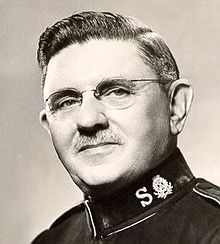I know Thee who Thou art,
And what Thy healing name,
For when my fainting heart
The burden nigh o’ercame,
I saw Thy footprints on my road
Where lately passed the Son of God.
Thy name is joined with mine
By every human tie,
And my new name is Thine;
A child of God am I,
And never more alone, since Thou
Art on the road beside me now.
Beside Thee as I walk,
I will delight in Thee,
In sweet communion talk
Of all Thou art to me;
The beauty of Thy face behold
And know Thy mercies manifold.
Let nothing draw me back
Or turn my heart from Thee,
But by the Calvary track
Bring me at last to see
The courts of God, that city fair,
And find my name is written there.
 Here is another meaningful song by Albert Orsborn, one of the Salvation Army’s Generals of the 20th century (1946-1954). It was said of him that “on the platform he grips the attention both by his gift of language and the vigour of his ideas. At the conference table he patiently considers all sides of a problem and makes decisions in the manner of the successful administrator.”
Here is another meaningful song by Albert Orsborn, one of the Salvation Army’s Generals of the 20th century (1946-1954). It was said of him that “on the platform he grips the attention both by his gift of language and the vigour of his ideas. At the conference table he patiently considers all sides of a problem and makes decisions in the manner of the successful administrator.”
Orsborn was greatly influenced by a woman Salvationist who kept a shop in Dundee, where his father was once the officer. She spoke such appropriate words to Albert each time he bought items there, that she had a lasting effect for good on his life. It is unlikely that this woman was still alive to see the boy rise to become the Army’s worldwide leader!
Albert Orsborn said that the above song “grew out of the ploughshare of suffering”. The last verse was his favourite, and he often sang it for himself in private prayer. He wrote the music as well, although he was not considered a composer.
the above song “grew out of the ploughshare of suffering” Share on XWORDS AND MUSIC: ALBERT ORSBORN
S.A.SONG BOOK, 1987 EDITION, # 59; 2015 EDITION, #79
REFERENCE: JACKET FOR CD THE HYMNMAKERS – MIGHTY TO SAVE





